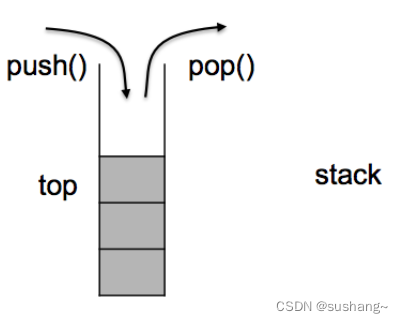C++初阶-stack的使用与模拟实现
发布时间:2023年12月17日
stack的使用与模拟实现
一、stack的介绍和使用
1.stack是一种容器适配器,专门用在具有后进先出操作的上下文环境中,其删除只能从容器的一端进行元素的插入与提取操作。
2.stack是作为容器适配器被实现的,容器适配器即是对特定类封装作为其底层的容器,并提供一组特定的成员函数来访问其元素,将特定类作为其底层的,元素特定容器的尾部(即栈顶)被压入和弹出。
3.stack的底层容器可以是任何标准的容器类模板或者一些其他特定的容器类,这些容器类应该支持以下操作:
empty:判空操作
back:获取尾部元素操作
push_back:尾部插入元素操作
pop_back:尾部删除元素操作
4.标准容器vector、deque、list均符合这些需求,默认情况下,如果没有为stack指定特定的底层容器,默认情况下使用deque。

二、stack的使用
| 函数说明 | 接口说明 |
|---|---|
| stack() | 构造空的栈 |
| empty() | 检测stack是否为空 |
| size() | 返回stack中元素的个数 |
| top() | 返回栈顶元素的引用 |
| push() | 将元素val压入stack中 |
| pop() | 将stack中尾部的元素弹出 |
void test_stack()
{
stack<int> st;
st.push(1);
st.push(2);
st.push(3);
st.push(4);
while (!st.empty())
{
cout << st.top() << " ";
st.pop();
}
cout << endl;
}
int main()
{
test_stack();
return 0;
}
三、stack的模拟实现
??经过学习上面的stack接口。我们可以从栈的接口中看出,栈实际是一种特殊的vector,因此使用vector也完全可以模拟实现stack。(实际上底层实现是使用deque来做容器适配器)
stack容器适配器
??STL中的stack类本质上是一种容器适配器,容器适配器是一个封装了序列容器的类模板,它在一般序列容器的基础上提供了一些不同的功能,之所以称作适配器类,是因为它可以通过适配器现有的接口来提供不同的功能。
??stack容器适配器的模板有两个参数,第一个参数是存储对象的类型,第二个参数是底层容器的类型。stack的底层容器默认是deque容器,因此模板类型其实是template<class T,Class Container = deque> class stack。
3.1 成员变量
template<class T,class Container=vector<T>>
class stack
{
private:
//vector<T> _v;
Container _con;
};
3.2 成员函数
3.2.1 push入栈
void push(const T& x)
{
_con.push_back(x);
}
3.2.2 pop出栈
void pop()
{
_con.pop_back();
}
3.2.3 返回栈顶数据
const T& top()
{
return _con.back();
}
3.2.4 返回栈的大小
size_t size()
{
return _con.size();
}
3.2.5 判断栈是否为空
bool empty()
{
return _con.empty();
}
四、完整代码
4.1 stack.h
#pragma once
namespace zl
{
//适配器模式/配接器
template<class T,class Container=vector<T>>
class stack
{
public:
void push(const T& x)
{
_con.push_back(x);
}
void pop()
{
_con.pop_back();
}
const T& top()
{
return _con.back();
}
size_t size()
{
return _con.size();
}
bool empty()
{
return _con.empty();
}
private:
//vector<T> _v;
Container _con;
};
void test_stack()
{
//stack<int, vector<int>> st;
//stack<int, list<int>> st;
stack<int> st;
st.push(1);
st.push(2);
st.push(3);
st.push(4);
while (!st.empty())
{
cout << st.top() << " ";
st.pop();
}
cout << endl;
}
}
4.2 test.h
#define _CRT_SECURE_NO_WARNINGS 1
#include<iostream>
#include<stack>
#include<vector>
#include<list>
using namespace std;
#include "stack.h"
int main()
{
zl::test_stack();
return 0;
}
文章来源:https://blog.csdn.net/m0_70091181/article/details/135045633
本文来自互联网用户投稿,该文观点仅代表作者本人,不代表本站立场。本站仅提供信息存储空间服务,不拥有所有权,不承担相关法律责任。 如若内容造成侵权/违法违规/事实不符,请联系我的编程经验分享网邮箱:chenni525@qq.com进行投诉反馈,一经查实,立即删除!
本文来自互联网用户投稿,该文观点仅代表作者本人,不代表本站立场。本站仅提供信息存储空间服务,不拥有所有权,不承担相关法律责任。 如若内容造成侵权/违法违规/事实不符,请联系我的编程经验分享网邮箱:chenni525@qq.com进行投诉反馈,一经查实,立即删除!
最新文章
- Python教程
- 深入理解 MySQL 中的 HAVING 关键字和聚合函数
- Qt之QChar编码(1)
- MyBatis入门基础篇
- 用Python脚本实现FFmpeg批量转换
- 基于ssm缪斯乐器购物网站的设计与实现论文
- WinSCP本地安装部署并结合内网穿透实现远程连接服务器
- 基于python深度学习对起痘原因识别-含数据集和代码
- 月经来3天 VS 7天,哪种才正常?
- C++ 之LeetCode刷题记录(四)
- facebook广告怎么避免被封号
- 企业“数据入表”之政策及业务模式解读
- 网络协议攻击与模拟_02ARP协议
- element表格复选框回显,取消选择
- 值得推荐免费数据恢复教程,12个数据恢复软件